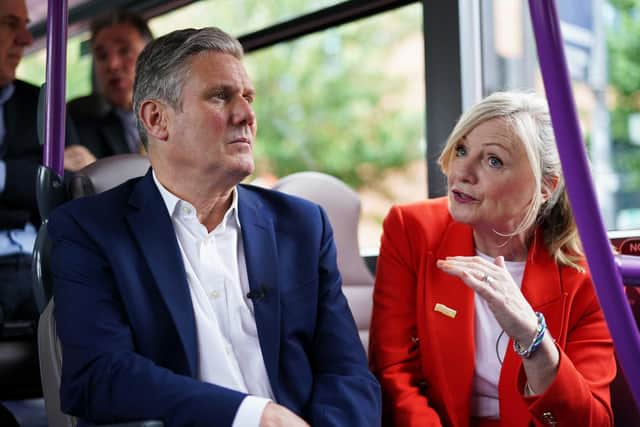The Government should give control of buses back to accountable public authorities - Luke Raikes
From sleepy, picturesque villages, to post-industrial towns and vibrant city centres, people wait in line at the bus stop. They stand and wait, often in the cold and rain. Frustrated and powerless, because their bus – infrequent at the best of times – is, of course, late. Again.
Buses are a big deal. Every so often Westminster wakes up to this fact, before going back to business as usual. Northerners are rightly outraged by the shocking performance of our trains. But buses account for more than twice as many journeys as trains in England. A quarter of people use a bus at least once per week. The government found that bus schemes deliver benefits worth more than four times their cost.
Advertisement
Hide AdAdvertisement
Hide AdAt the Fabian Society we have been asking the public what change they want to see across the country. This is for our Commission on Poverty and Regional Inequality, which brings England’s regions together to improve living standards. It’s not long before someone raises buses. And the way people feel, a combination of outrage and resignation, is the same – not just from Huddersfield to Hull, but from Cornwall to Northumberland. Because outside of London, our buses are in a terrible state.


Like many of our problems, this dates back to the 1980s: bus deregulation is one of many mistakes made by the government of the time. Communities across Yorkshire, and across the country, are still paying the price every day.
You might expect something like a bus network to be planned and coordinated – for someone, somewhere to be joining the dots to make sure people can get from A to B, change buses, or change onto a tram, train or bike. And for someone, somewhere, to be accountable when it goes wrong.
But deregulation in the 1980s made buses a free-for-all – private bus companies put on the routes they want, and look to make as much profit as they can. Nobody joins the dots. There’s no accountability.
Advertisement
Hide AdAdvertisement
Hide AdWhen this system was put in place, the idea was to spur competition. But there is nothing of the sort. A bus company’s monopoly is almost impossible to break, because of the small number of depots that serve any one place, and any new company will face an uphill battle to establish themselves – they would need to build a whole profitable network from scratch. Our system is almost unique in the developed world. And with good reason - it doesn’t work.
Bus routes have suffered due to the pandemic, but even in the decade before Covid-19, bus mileage outside London was already down 18 per cent. Our bus system makes such little sense that even George Osborne relented, and let metro mayors and Cornwall develop a ‘London-style’ network. In the areas given such powers, the local transport authority draws up a contract which specifies the routes they want companies to run. That means they can plan networks properly. They then tender the contract, which lets private companies compete properly for it. And then they performance manage it – making sure operators do what they are paid to do.
Bus fares aren’t all syphoned out to shareholders, they are mostly kept within the area to be reinvested or to subsidise less profitable routes. Depots are brought under public control. This regulated, or ‘franchised’ system is far better. This is how it works in London.
In Greater Manchester, the mayor, Andy Burnham, has seized this huge opportunity. In September this year, 50 new, electric, bright yellow and black buses will roll onto the streets of Wigan and Bolton, contracted and performance managed by Transport for Greater Manchester.
Advertisement
Hide AdAdvertisement
Hide AdBut it has been a hard and expensive slog. The legal hurdles are still significant and well-funded bus companies throw their toys out of the pram, threatening to leave the public stranded, and challenging decisions through judicial review. West Yorkshire now faces these same challenges. It will be worth it. But why should it be so difficult, to do something so obviously right, that London already does, and that is standard in other countries?
The Labour Party has said they will make it easier for local areas to take up this model if they win the general election. This should cheer all of us who are fed up of waiting in the rain for a bus that feels like it may never come.
But is it really enough just to remove the barriers? Bear in mind we are effectively asking cash-starved councils and mayors to clean up a colossal 40-year mess of central government’s making. At the very least, this needs proper government funding.
Central government should do more. Rather than just making it a bit easier, why not proactively work with mayors and councils to allow them to take control of their local bus network? This would be a great way of empowering local government, which all political parties have committed to. The Welsh Government has already started to take this route.
Advertisement
Hide AdAdvertisement
Hide AdThe prize of doing this would be huge. Bus reform is, relatively speaking, a quick win. It is far easier and quicker to implement than other transport policies. With a bit of willpower and resources, we could start to see a difference within one term of government. In transport terms, that’s lightning speed. One of the best things the government could do is give control of buses back to accountable public authorities.
Luke Raikes is research director at the Fabian Society.